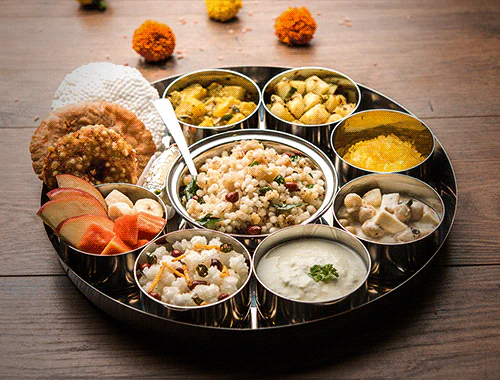During Navratri, many people observe fasting, which involves avoiding certain foods and consuming a special diet to honor the goddess Durga. The fasting rules can vary slightly depending on region and personal preferences, but there are several common foods that are allowed. Here’s a detailed guide to what you can eat during Navratri fasts:
1. Fruits
- Fruits are a staple during Navratri fasting. You can eat a wide variety of fresh fruits such as:
- Apples
- Bananas
- Papayas
- Oranges
- Grapes
- Pomegranates
- Fruits provide essential vitamins, fiber, and hydration, and can be eaten throughout the day.
2. Vegetables
- Non-starchy vegetables are allowed, and they provide fiber, vitamins, and minerals. Common choices include:
- Potatoes
- Sweet potatoes
- Pumpkin
- Bottle gourd (lauki)
- Cucumber
- Carrots
- Spinach
- Tomatoes
- These vegetables can be boiled, sautéed, or made into light curries or stir-fries.
3. Sabudana (Tapioca Pearls)
- Sabudana is a favorite ingredient during Navratri. It is commonly used to make:
- Sabudana Khichdi (a savory dish with peanuts and spices)
- Sabudana Vada (fried tapioca fritters)
- Sabudana is light on the stomach and is a good source of energy due to its high carbohydrate content.
4. Kuttu ka Atta (Buckwheat Flour)
- Buckwheat flour is another fasting-friendly ingredient, and it is gluten-free. It is used to make:
- Kuttu Ki Puri
- Kuttu Ka Paratha
- Kuttu Cheela (savory pancake)
- It provides good energy and is high in fiber.
5. Singhare Ka Atta (Water Chestnut Flour)
- Water chestnut flour is another common flour used during fasting. It can be used to make:
- Singhare Ki Puri
- Singhara Halwa (a sweet dessert)
- It’s rich in minerals like potassium and provides energy.
6. Rajgira (Amaranth)
- Rajgira is a superfood allowed during fasting. It is used to prepare:
- Rajgira Porridge
- Rajgira Laddoo (sweet snack)
- Rajgira Roti
- Rajgira is rich in protein, fiber, and calcium.
7. Samak Rice (Barnyard Millet)
- This millet is commonly used as a substitute for regular rice during fasts. It is used to prepare:
- Samak Rice Khichdi
- Samak Rice Pulao
- It’s light and easy to digest, rich in fiber and minerals.
8. Dairy Products
- Dairy is allowed during Navratri, and it is a good source of protein and calcium. You can consume:
- Milk
- Curd (Yogurt)
- Paneer (cottage cheese)
- Buttermilk
- Ghee
- You can prepare yogurt-based dishes or make paneer stir-fries and curries.
9. Dry Fruits and Nuts
- Dry fruits and nuts provide healthy fats, protein, and energy. Commonly consumed during fasts:
- Almonds
- Cashews
- Raisins
- Walnuts
- Dates
- They are great for snacking or adding to desserts and fruit salads.
10. Peanuts
- Peanuts are widely used during fasting. They can be eaten:
- Roasted
- Used in Sabudana Khichdi
- Ground into chutneys
- Peanuts provide healthy fats and protein.
11. Rock Salt (Sendha Namak)
- Regular table salt is avoided during Navratri fasting. Instead, rock salt (sendha namak) is used in cooking, as it is considered pure and less processed.
12. Sweets and Desserts
- Desserts made from permitted ingredients can be consumed, such as:
- Makhana Kheer (puffed lotus seeds in sweetened milk)
- Lauki Ka Halwa (sweet dish made from bottle gourd)
- Sabudana Kheer (tapioca pearls in sweetened milk)
- Coconut Laddoos
- These sweets are made using natural sugars like jaggery or fruits.
13. Herbs and Spices
- Certain herbs and spices are allowed, including:
- Cumin seeds (Jeera)
- Black pepper
- Green cardamom
- Cinnamon
- Cloves
- Fresh coriander (dhaniya)
Foods to Avoid During Navratri Fasting:
- Grains: Wheat, rice, corn, and other regular cereals are avoided.
- Pulses and Lentils: All kinds of lentils, beans, and legumes are restricted.
- Non-Veg Foods: Meat, eggs, and fish are not allowed.
- Garlic and Onions: These are avoided as they are considered tamasic in nature.
- Processed and Refined Foods: Refined sugar, processed foods, and preservatives should be avoided.
By focusing on fresh, light, and natural foods, fasting during Navratri can be both a detox and a spiritual cleanse.



